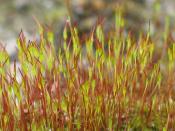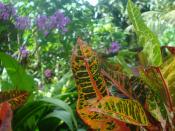I turned this paper in two days late, but the teacher was so impressed that I still got 100% Excellent; I couldn' t have written a better paper myself.
DIVERSITY OF PLANTS
Plants evolved more than 430 million years ago from multicellular green algae. By 300 million years ago, trees had evolved and formed forests, within which the diversification of vertebrates, insects, and fungi occurred. Roughly 266,000 species of plants are now living.
The two major groups of plants are the bryophytes and the vascular plants; the latter group consists of nine divisions that have living members. Bryophytes and ferns require free water so that sperm can swim between the male and female sex organs; most other plants do not. Vascular plants have elaborate water- and food conducting strands of cells, cuticles, and stomata; many of these plants are much larger that any bryophyte.
Seeds evolved between the vascular plants and provided a means to protect young individuals.
Flowers, which are the most obvious characteristic of angiosperms, guide the activities of insects and other pollinators so that pollen is dispersed rapidly and precisely from one flower to another of The same species, thus promoting out crossing. Many angiosperms display other modes of pollination, including self-pollination.
Evolutionary Origins
Plants derived from an aquatic ancestor, but the evolution of their conducting tissues, cuticle, stomata, and seeds has made them progressively less dependent on water. The oldest plant fossils date from the Silurian Period, some 430 million years ago.
The common ancestor of plants was a green alga. The similarity of the members of these two groups can be demonstrated by their photosynthetic pigments (chlorophyll a and b,) carotenoids); chief storage product (starch); cellulose-rich cell walls (in some green algae only); and cell division by means of a cell plate (in certain green...


